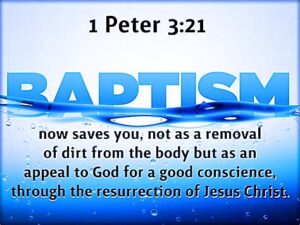Water-Baptism – BT6: Water-baptism is a required part of the ‘Great Commission’ to go and make disciples of all nations

Water-Baptism – BT6: Water-baptism is a required part of the ‘Great Commission’ to go and make disciples of all nations
Please follow the BLOG Etiquette to stay on topic and pass the moderator’s check. Bold, underlined text below = future links to the BLOG pages.
We touched on this already in Water-Baptism – BT2. In the ‘Great Commission’ of Matthew 28:19-20, Jesus said to His apostles to: “Definitively/wholly poreuomai already having therefore ‘transported/gone to another place,’ [I strongly urge you to] definitively/wholly matheteuo make-disciples-of ALL the nations, routinely baptizo water-baptizing [by immersion] them eis ‘toward and reaching the goal of’ the [singular] name/authority of-the Father and/coupled of-the Son and/coupled of-the Holy Spirit, (the coupling implied the Triune God), routinely teaching them to tereo ‘watch-carefully/guard to maintain/preserve/keep-intact’ hosos how-ever-many that I have entollomai ‘officially decreed/commanded as universally-binding’ you.”
The parallel passage in Mark 16:15-16 has Jesus saying a similar thing: “Definitively/wholly poreuomai already having ‘transported/gone to another place,’ eis ‘toward and reaching the goal of’ the pas whole world [of people], [I strongly urge you to] definitively/wholly kerusso proclaim-herald-preach [the logos message of] the ‘Great News’ gospel to pas all of that creation. The [one] who has definitively/wholly had trusting-relying-faith kai and/coupled definitively/wholly has been baptizo water-baptized shall actually be saved; however, the [one who] had definitively/wholly not-had-trusting-relying-faith will be condemned.” This passage is usually considered the earlier, shorter version of the ‘Great Commission.’
Notice the same structure of assuming they have already ‘gone into the whole world”, the imperative’s strong-urging of Jesus, but here Matthew’s “disciple-making by routinely water-baptizing” of Matthew’s “all the nations” or Mark’s “the whole world [of people] . . . of all that creation [of people]” must therefore equate to “proclaiming/preaching the gospel that brings the whole world’s people to take 2 coupled-together required actions in order to “actually be saved”: 1) “definitively/wholly have trusting-relying-faith kai and/coupled 2) “definitively/wholly be baptizo water-baptized.” And the opposite of this that meets with condemnation is simplified to “NOT definitively/wholly having trusting-relying-faith.” Adjoined phrases in Greek are NOT separate ideas but the same parallel idea described 2 ways for clarification and emphasis, much like poetic stanzas are.
As we have seen in previous BLOGs and Obedient Steps of Faith – BT15, the NT writers understood that genuine trusting-relying-faith that actually saves you is a process of 5 steps, the last being water-baptism – see Salvation – BT1. And here we see that this last opposite “condemnation” phrase as parallel stanza means that not being condemned or having salvation thus requires a trusting-relying-faith that includes water-baptism, made even clearer by the kai coupling of trusting-relying-faith to water-baptism – see Luke 24:47’s Great Commission. John the Baptist prepared the way for the Lord and John required “water-baptism of/belonging-to repentance eis ‘toward and reaching the goal of’ the forgiveness of sins” (Mark 1:4; Luke 3:3).
Let’s now ‘unpack’ Matthew’s version: “Go” and “make disciples” are both Greek aorist tense verbs that tell of the timing – the chronology relative to the other actions in the verses. The aorist passive participle of poreuomai “go” is better translated, “You-all [11 apostles], already having been [passively] definitively/wholly transported to other destinations [by My orders and thru the Holy Spirit as we see in the book of Acts]. The aorist participle puts this in the past relative to the other verbs in the sentence of “making disciples, water-baptizing, and teaching.” It is assumed they will be ‘marching’ to other ports!
The Greek verb matheteuo for “make-disciples-of” is used only 3 other times. In Matthew 27:57 it literally means, “who also himself was disciple-by Jesus.” In Matthew 13:52 it’s translated “has become-a-disciple-of … the kingdom of heaven.” In Acts 14:21, it is translated “had made-many-disciples” as something done additionally to preaching the gospel logos message. This could explain why Mark 16:15-16’s shorter version (65-75 AD) of the ‘Great Commission’ doesn’t mention “disciple-making” – Jesus assumed it in the preaching of the gospel, but by Matthew’s version (60 -90 AD) and Acts 14:21, clarification needed to be made? It should have been common knowledge that a disciple is one who “voluntarily takes on the disciplines given to him by his leader/rabbi in the process of learning from and following him.” Matthew’s focus was on Jesus as respected rabbi, and Mark about Christ’s miraculous doings.
Jesus said His disciples would have to make hard choices to follow Him, even leaving family members (a), bearing your own cross of self-denial and of persecution from others (b), and renouncing everything for Jesus (c). You can’t just agree with His gospel logos message for a little while, you have to meno ‘abide, remain, continue, live with’ His gospel logos message in order to actually be set free from the slavery of the practice of sin (d). An endurance of trusting-relying-faith is required to be truly saved – see Obedient Steps of Faith – BT16. Unconditionally-loving one another proves we are His disciples, and is our only true witness to the world (e), for certainly this is the “proving” [singular] fruit that glorifies the Father (f). The only 2 NT commandments of “Trusting-relying-faith and unconditional-love” are integrally tied together throughout the NT – see Only 2 Commandment – BT6. <Notes> a) Luke 14:26, b) Matthew 16:24; Luke 14:27, c) Luke 14:33, d) John 8:31, e) John 13:35, f) John 15:8.
Jesus use the imperative to strongly urge the apostles to “make believers” not people who simply ‘mentally-agree with’ the gospel logos message they preached about Jesus as their Messiah or Savior. “Mental agreement” is NOT the definition of having pistis trusting-relying-faith – see Obedient Steps of Faith – BT2. Nor did Jesus use the imperative just to get people to simply confess theCreeds of the Christian faith, because that is NOT the definition of repentance – see Surrender Control or the meaning of confession – but see also Obedient Steps of Faith – BT15.
A “disciple” is much more than a mental believer or confessor – those who have made Jesus the Kurios Lord/Master/Owner of their life – and Jesus is about to further define the “disciple-making” process in Matthew’s account. The earliest confessions of The-Trusting-Relying-Faith were “Jesus is Messiah-Savior and Lord!” Here the imperative verb “make-disciples-of” is indicating Christ’s central strong-urging for which all the other verbs relate. It’s assumed that once the 11 apostles have poreuomai already ‘transported/gone to another place’ that it was for the purpose of “making disciples,” not just enjoying the view, doing business, or just preaching the gospel. Again, the aorist tense means that Christ is viewing the action as a whole, for certainly discipleship is a lifetime process. Because of the imperative Jesus could also be emphasizing it definitively – “get it done as good as done!” Now, the next 2 present participles actually describe adjectively what goes on in “making disciples.”
The present active participle of baptizo “Water-baptizing“ is better translated, “you-all [11 apostles], ‘routinely as a lifestyle habit’ be water-baptizing.” Yes, water-baptizing people was supposed to be their habit of “making disciples” or followers of Jesus. It’s erroneous to think that you can be saved without being a follower of Jesus – “whoever does absolutely-in-fact-NOT presently/ongoingly take up his cross and/coupled presently/ongoingly follows Me is absolutely-in-fact-NOT worthy of Me” (a), and “My sheep akouo hear/listen-to-understand/know My Voice and/coupled I experientially, relationally ginosko know THEM and/coupled THEY follow Me” (b), and “If anyone serves Me, he MUST follow Me – and/so where I AM, there will also be My servant” (c). There will be a lot of so-called ‘Believers’ of Jesus at Judgment Day who never became followers/disciples of Jesus because they were never water-baptized, but then in actuality they are “absolutely-in-fact-NOT worthy of Jesus” and are “NOT His sheep or relationally known by Him” and certainly are “NOT His servants to be where Jesus is now.” What a rude awakening it will be for them to face hell instead! <Notes> a) Matthew 10:38, 16:24, cf. 8:22, 19:21; Mark 8:34, 10:21; Luke 9:23, 59, 18:22, b) John 10:27, c) John 12:26.
But that’s not all is required for “making-disciples!” The next present active participle is didasko “teaching,” but in context this doesn’t mean teaching them to obey everything that Jesus taught about on every subject – and remember, most never got written down (a). Too many preachers have made this their mission but it wasn’t Christ commission. If it were, you would never finish working with even 1 believer in order to make Him a disciple! Nope! Jesus said instead: “routinely as a lifestyle habit’ teaching them to tereo ‘watch-carefully/guard to maintain/preserve/keep-intact’ hosos how-ever-many that I have entollomai ‘officially decreed/commanded as universally-binding’ you.”
A careful study will reveal only 2 such commandments in the completely-different-in-kind New Covenant, so perfectly combined in 1 John 3:23: “And this is God’s [singular] entole commandment: that we should definitively/wholly have trusting-relying-faith in the name/authority of His Son Jesus Christ and/coupled presently/ongoingly should unconditionally-love one-another-reciprocally, just as He (Jesus Christ) already has given [singular] entole commandment to us.” This was the catechism taught as part of the gospel logos message to become disciples. The 1st entole commandment from the Father is directed to unbelievers to enter into His unconditional-love – see Logos Word of God – BT15. The 2nd entole commandment is from the Son that is directed to believers to live His life of unconditional-love thru them for witness/testimony to bring the kingdom of God to earth – see Logos Word of God – BT16. Again, there are a lot of components taught about each of these commandments in order to be obeyed – even 1 John goes into great length about each, but particularly the unconditional-love these believers are struggling with. Both are required to be disciples/followers of Jesus and thus to be saved. <Notes> a) John 21:25.
Spiritual Education, Water-baptism required in Great Commission of gospel, Only 2 commandments to teach to carefully-watch-to-guard in the New Covenant – faith and love, water-baptism is the ‘obedience of faith’ thesis of Paul’s Romans gospel, surrender as repentance required before water-baptism, confession of sin and confession of Jesus as Savior and Lord done at water-baptism, faith is NOT mental belief – the demons believe, faith without the work of faith and the work of love is dead lifeless and worthless



Leave a Reply